Photo: Paul Rudderow
Who: Philadelphia Union at Vancouver Whitecaps
What: 2015 regular season game
Where: BC Place
When: Saturday, May 9 at 7 pm
Watch: TCN, MLS Live, MLS Direct Kick
Whistle: Ismail Elfath; Linesmen: Paul Scott, Eduardo Mariscal; Fourth official: Juan Guzman
Vancouver Whitecaps are 5-3-2 and tied for first place in the extremely competitive Western Conference. Philadelphia Union are 1-6-3 and floating above the milquetoast Eastern Conference cellar by virtue of Montreal Impact being quite bad (and having a hilarious six games in hand). However, Vancouver is only 2-1-2 at home and have given up eight of the nine goals they have allowed this season in the friendly confines of BC Place. And while the Union have scored seven of their ten goals on the road, they have also given up a disappointing twelve goals in five matches. That means even if you consider the Columbus massacre an outlier, Philly is giving up two goals per game when they travel. Not good.
Why don’t the Whitecaps, a team loaded with as many offensive weapons as any in MLS, dominate at BC Place? The obvious answer may turn out to be the correct one: Teams rarely come out of their shell in Vancouver. The costs are simply too high for most managers who look at Pedro Morales’ passing range and recognize that leaving space in midfield is equivalent to giving the Chilean your vote for MVP. With Octavio Rivero brought in to play the role of poacher, Morales’ passes and the relentless athleticism of the offense are finally paired with the end product they deserve.
A deeper look gives even more support for parking the bus. Vancouver has earned home points by beating Portland and Los Angeles, and through a 2-2 draw with Columbus. All three of those opponents tend to play the same way no matter where they go, utilizing their well-drilled system as a skeleton key that can open any road goal. The Whitecaps were very respectful of Portland, playing a pure counterattacking game that limited good chances and looked to hit the Timbers on the break. The plan worked, but only because Nicolas Mezquida curled in a wonderous free kick and the entire Portland defense turned off in extra time to let Robert Earnshaw in for the winner.
The lesson Carl Robinson took away from that narrow victory was that he had to trust his young team to implement his system no matter the opponent. Against Los Angeles, the Whitecaps were far less passive, dominating play until going two goals ahead. It was a similar story when the Crew came to town, with Vancouver soaking up 62 percent of possession against a team that rarely gives the ball up without a fight.
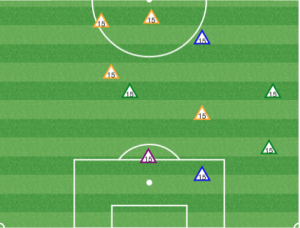
This brazen decision to play their own way in any situation has a catch: Everyone else figures it out. Thus, the Whitecaps have spent the past four matches trying to cement their place in MLS’ upper echelon by developing secondary routes to goal when the opposition sits on their Morales-Rivero fastball. Two goals in four matches suggests the squad has had growing pains, though there is a major confounding factor at play.
Labatime
Jim Curtin was not wrong when he said at his mid-week presser that Mattias Laba is a key part of the Whitecaps’ current success. Laba’s brilliance is in his ability to read the game so quickly that he can cover for teammates all over the pitch. Some defensive midfielders sit deep and force play wide defending the break. Others aggressively attack the ball and force players into mistakes before a breakout can hit full flight. Laba is equally comfortable doing both, and he rarely chooses the wrong option.
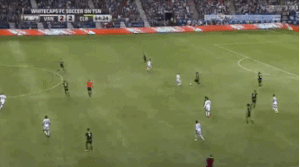
When LA came to BC Place, Robbie Rogers came on in the 40th minute. Los Angeles then pushed the ball out to Baggio Husidic and Rogers on the left, looking to draw out Steven Beitashour and make Kendall Waston leave the middle in support. With Waston out of the center, Bruce Arena liked his strikers’ chances against the mercurial Pa Modou Kah. However, Laba was so quick to help that the Galaxy could never pull Waston out and were forced to rely on Stefan Ishizaki’s crossing from the right (not a terrible option, by any means) to generate chances.
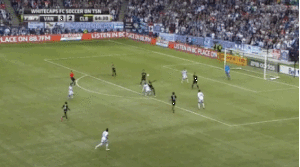
As he has developed, Laba has begun using his quick thinking and quick feet in the offensive half as well. In one sequence against Columbus, Laba dispossessed Tony Tchani just above the Crew box, then did the same thing to Mohammed Saeid moments later after a Kekuta Manneh shot was blocked. Tchani and Saeid do not give up the ball easily, especially in their own half. Laba is that quick; he is that good.
And after receiving two cautions and a dismissal against DC United two weeks ago, Laba was suspended against Portland last week. Importantly, Vancouver has only given up one goal in the game and a half they played without Laba. In Koffie and the developing Russell Teibert, the Whitecaps have personnel that can emulate much of what Laba does in a defensive shape. Losing Laba shows up much more in how Vancouver breaks out of that shape and pushes the ball to Pedro Morales and the wingers.
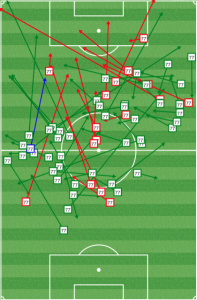
Predictable
The Whitecaps’ renewed focus on playing their system no matter what has enlarged the already-gigantic target on Pedro Morales’ back. The Chilean playmaker is probably the best long passer in MLS, with precision that matches his impressive vision. Morales’ genius is that he can adjust to the players around him instead of needing everyone else to figure out what he wants to do with the ball. This is especially important for Vancouver’s plethora of young talent. Kekuta Manneh, Cristian Techera, Darren Mattocks, and Nicolas Mezquida are all willing runners, but they read the game at a pace that often belies their young age. Morales is good enough to wait an extra touch while his teammates to pick the runs they should have started before the ball arrived at their playmaker’s feet.
But “good enough to wait” implies that Morales has time to wait, and recently he has not. Ever since Dom Kinnear figured out how to clog up the space between Vancouver’s defensive midfielders and Morales, opposing managers have sought to force the Whitecaps to get upfield before finding their talisman. It took a mind like Kinnear’s to reason that Morales unique passing talents may mean he is actually less dangerous if forced to play closer to goal. The logic is that there is less space in the final third, and while Morales is hardly static, he would much prefer to sit on the ball and pick out absurd passes than play two or three give and goes to get into space the way Federico Higuain does in a similar playmaking role for Columbus.
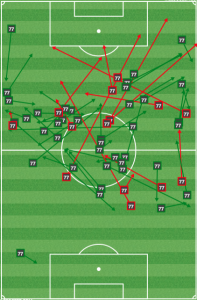
Morales in space is nary unstoppable; Morales in tight areas is still dangerous, but much less so. One issue for Philly: Mo Edu is a caution away from suspension, so he will have to cover Morales intelligently or the Union will lose yet another central midfielder.
All that jazz
It is so important to control Morales because the players he is passing to are quick, strong, and can run forever. Vancouver loves to play through Morales then out to the wings because their wingers feel comfortable taking on any fullback they come up against. Ray Gaddis, for example, is as quick as defenders get in MLS, and he will struggle to catch Manneh or Mattocks at full pace.
However, none of the talent-laden wide players and strikers that populate the Vancouver roster has developed into a consistent goal threat. They can create their own chances and get in good positions by virtue of their athleticism, but they do not finish with the confidence.
Octavio Rivero does. The new signing has not scored in a month, but he has continued to put shots on frame; the dry spell will not last. If you want to know what Fernando Aristeguieta would look like on a team with the talent to compete for MLS Cup, watch Rivero. He moves in the box, he can create his own shot, and he displays the selfishness that can both fuel and destroy good strikers depending on how it manifests in games.
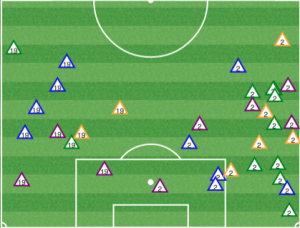
Union goals
Based on everything written above, Philadelphia should have one primary goal: Prevent Pedro Morales from getting the ball in space. The Chilean’s passing range means Vancouver has the most expansive counterattack in the league, and Philly’s defense will get torn to shreds attempting to cover runners while Morales looks around for his best option. Maurice Edu will likely be tasked with closing down Morales while Ray Gaddis and a player to be named later track runners. The Whitecaps are far less dangerous when Morales plays to Rivero early, as this pulls the striker too far from goal. So for once, the Union’s central defenders can sit deep without playing directly into the opponent’s hands.
If Philly can frustrate Vancouver’s counterattack, they should be able to put together an offensive possession or two of their own. The Whitecaps utilize high pressure that relies on energy more than shape (though Robinson seems a smart enough coach to tweak this as the players mature). If the Union can get out of the back in two passes and find Cristian Maidana, they can attack Vancouver up the center-left channel. Pa Madou Kah is by far the weakest link in the back line, and if any Union winger can run at him, Philly will be able to create chances.
Kah’s partner, Kendall Waston, is at the other end of the spectrum. He’s big, fast, agile, and smart. Philly will have much less success if Aristeguieta is forced to battle the Costa Rican than if he can isolate Kah, especially since Kah is one caution away from a suspension.
Conclusion: Whitecaps 2-0 Union
The prediction is almost inescapable. Philly averages two goals against on the road and has yet to show they can maintain a defensive shape for any length of time. Add in that Michael Lahoud will be missing and Vincent Nogueira is still not fully fit and you have a short-handed midfield that is will have to play at a level they have not touched so far this season.
The real question is about the team’s character. After a strong start with a depleted lineup in Columbus, the Union folded when a quick jab of a goal landed early. It is entirely possible that a similar scenario plays out against one of the best teams in the west. How will the Union respond if it does?
Any struggling side needs to build on something solid. This does not have to be a strong defensive effort or a solid offensive display. It can be something smaller like one player turning in an all-effort performance or a normally reserved guy letting his emotions out after a play. So far the Union have ambled back and forth between anxiety and relief, neither of which is a good emotional foundation on which to build confidence.
Something has to change. Young players getting minutes, a drastic formation switch (although Curtin rejected this idea Wednesday), or a change from pressing tactics to a much more conservative approach.
The Union are in danger of floating away, but the mediocre Eastern Conference is granting them time. That won’t last much longer.
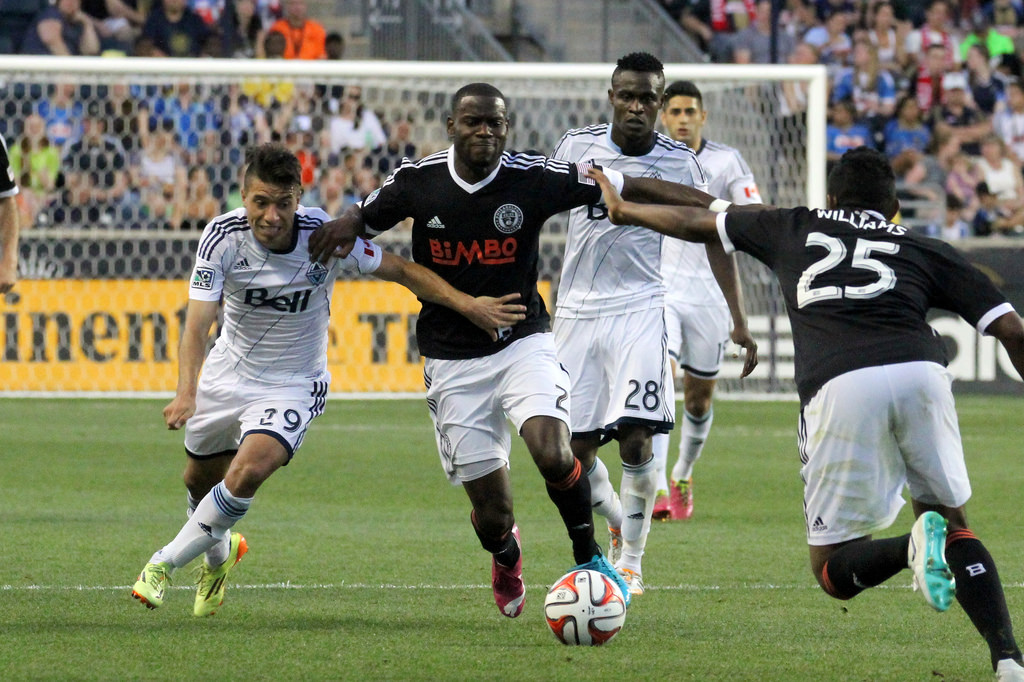

watching a Union game these days is less about soccer and more about NASCAR: waiting for the fiery crashes to happen
I’ll take that reference as far as NASCAR This week we blew up two engines and have to start the race with our back up car for another track.
And the guy in charge of selling ad space on the car keeps picking up his wrench and messing with the engine.
Milquetoast. Bonus points for word of the day.
.
Wish I was hopeful. But I’m not. This is a game I see the Onion losing handedly.
.
Will we have to wait 50 years for the file to be released on the Rais M’Bohli fiasco? Hope not. Would love to know what happened.
.
Here’s to our excommunicated keeper. Good luck. Western Canada is a fine place to have a come back.
The reverse Keon Daniel – Mbohli only plays for Union outside the U.S..
I got something easy for the SOB to cheer “Bring Back Zac and Fire Sak”
add a second line:
Stop the poop, we want to DOOP!
just an old meme..
“Pressing attacks”???
So it sounds like the key to having a chance is drape someone on Morales, and make them play 10v10. This used to be a role tailor-made for Brian Carroll. Does he still have it in him?
I believe he’s injured. When healthy…NO he does not have it in him.
“utilizing their well drilled system as a skeleton key”
.
do we have a well drilled system?
.
.
Vancouver, another team on the ascendancy playing a more closely resembled beautiful game. it will be nice to watch them. not us. them.
.
I can’t believe we are all so deflated on this team that not even Tom Brady would touch us (too easy?). Unfortunately we have to be, there’s nothing to look forward to. I mean really, I pretty sure the lineup will be our famed 4-2-3-1, with Le Toux on a wing running aimlessly and losing shape. We will sit back and bunker, cede 65% possession, get beat by a ball over the top and eventually lose by 2 goals. Can anyone argue that?
.
The only worse part is knowing we will have to watch M’Bolhi, further slapping us in the face. Play the kids, change to formation, DO SOMETHING JIM!
Can M’bolhi play left back or wing?
I think my favorite part of this article is section called “Union Goals.” Seems like a very ironic title for this team…
Rais is not on the trip and Mo will start in the midfield not in the back